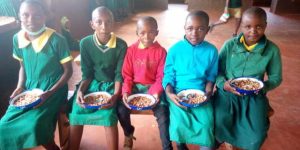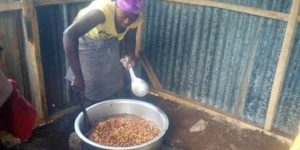Education is key to helping children improve their life chances, and good nutrition is key for school attendance and achievement. But many children in Kenya do not get the nutrition that they need. According to UNICEF, 26% of children in Kenya have stunted growth. It is estimated that 60% of children in Kenyan public schools are not getting adequate nutrition. Many families need to choose between heating, light, clothes, and food.
 This leads to major health challenges including pneumonia, malaria, measles, and micro- and macro-nutrient deficiencies, which in turn lead to ailments which inhibit school attendance and performance, most notably among children from impoverished families and from the slums. Research shows that poor nutrition leads to children starting school late, having poor school attendance, poor engagement, poor behaviour, and poor achievement. A vicious circle that condemns impoverished children to a continuing life of poverty.
This leads to major health challenges including pneumonia, malaria, measles, and micro- and macro-nutrient deficiencies, which in turn lead to ailments which inhibit school attendance and performance, most notably among children from impoverished families and from the slums. Research shows that poor nutrition leads to children starting school late, having poor school attendance, poor engagement, poor behaviour, and poor achievement. A vicious circle that condemns impoverished children to a continuing life of poverty.
Improving nutrition can have an immediate impact, especially where the food is provided within the school environment. It encourages attendance, ensures that children get at least one good meal a day (and is often the only meal that they get), and means that the development of the children can be regularly assessed. Children who are being fed will often take food back to their families, extending the benefit more widely.
 The Kenyan Government aims to increase the budget for school meals from $15m in 2023 to $35m in 2024 and to boost coverage from 1.6m children in 2023 to 10m by 2030, as a part of the Kenya 2030 programme. Unfortunately, this budget is not yet reaching all schools, and it is the schools in slums which seem to be at the end of the queue. This is where charities such as Kenya Children Centres (KCC) come into play. We work with schools in the most impoverished slum areas in and around Nairobi and Kirinyaga to purchase food locally and provide breakfasts and lunches to the children.
The Kenyan Government aims to increase the budget for school meals from $15m in 2023 to $35m in 2024 and to boost coverage from 1.6m children in 2023 to 10m by 2030, as a part of the Kenya 2030 programme. Unfortunately, this budget is not yet reaching all schools, and it is the schools in slums which seem to be at the end of the queue. This is where charities such as Kenya Children Centres (KCC) come into play. We work with schools in the most impoverished slum areas in and around Nairobi and Kirinyaga to purchase food locally and provide breakfasts and lunches to the children.
The impact of these initiatives has been impressive, and more detailed insights will be shared in our upcoming blog, specifically focusing on KCC’s School Feeding programmes.
Sources include UNICEF, the Kenyan Government, Save the Children, World Food Programme and KCC’s own research.